Related Research Articles
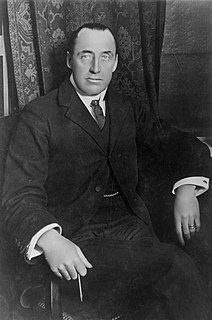
Edward Henry Carson, Baron Carson, PC, PC (Ire), from 1900 to 1921 known as Sir Edward Carson, was an Irish unionist politician, barrister and judge. From 1905 Carson was both the Irish Unionist Alliance MP for Trinity College Dublin and leader of the Ulster Unionist Council in Belfast. In 1915 he entered the war cabinet of Herbert Asquith as Attorney-General. Carson was defeated in his ambition to maintain Ireland as a whole in union with Great Britain. His leadership, however, was celebrated for securing a continued place in the United Kingdom for the six north-east counties, albeit under a devolved Northern Ireland Parliament that neither he nor his fellow unionists had sought. He is also remembered for his open ended cross examination of Oscar Wilde in a legal action that Wilde had brought, but led to him being gaoled and ruined. Carson unsuccessfully attempted to intercede for Wilde after the case.
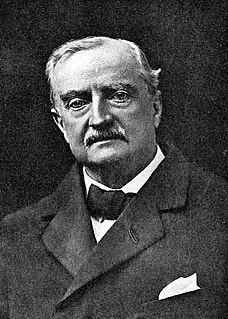
John Edward Redmond was an Irish nationalist politician, barrister, and MP in the British House of Commons. He was best known as leader of the moderate Irish Parliamentary Party (IPP) from 1900 until his death in 1918. He was also leader of the paramilitary organisation the Irish National Volunteers (INV).

Andrew Bonar Law was a British Conservative politician who served as Prime Minister of the United Kingdom from 1922 to 1923.
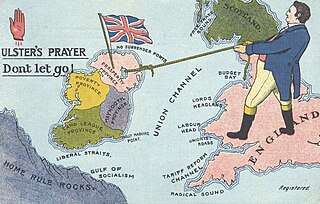
Unionism in Ireland is a political tradition on the island that professes loyalty to the Crown and Constitution of the United Kingdom. The overwhelming sentiment of a once ascendant minority Protestant population, in the decades following Catholic Emancipation (1829) it mobilised to oppose the restoration of an Irish parliament. As "Ulster unionism," in the century since Partition (1921), its commitment has been to the retention within the United Kingdom of the six Ulster counties that constitute Northern Ireland. Within the framework of a peace settlement for Northern Ireland, since 1998 unionists have reconciled to sharing office with Irish nationalists in a devolved administration, while continuing to rely on the connection with Great Britain to secure their cultural and economic interests.

Irish nationalism is a nationalist political movement which, in its broadest sense, asserts that the people of Ireland should govern Ireland as a sovereign state. Since the mid-19th century, Irish Nationalism has largely taken the form of cultural nationalism based on the principles of national self-determination and popular sovereignty. Early Irish nationalists during the 19th century such as the United Irishmen in the 1790s, Young Irelanders in the 1840s, Fenian Brotherhood during the 1880s and Sinn Féin and Fianna Fáil in the 1920s all styled themselves in various ways after French left-wing radicalism and republicanism. Irish nationalism celebrates the culture of Ireland, especially the Irish language, literature, music, and sports. It grew more potent during the period in which all of Ireland was part of the United Kingdom, which led to most of the island gaining independence from the UK in 1921.
The Curragh incident of 20 March 1914, generally known as the Curragh mutiny, occurred in the Curragh, County Kildare, Ireland. The Curragh Camp was then the main base for the British Army in Ireland, which at the time still formed part of the United Kingdom of Great Britain and Ireland. Ireland was scheduled to receive a measure of devolved government, which included Ulster, later in the year. The incident is important in 20th-century Irish history, and is notable for being one of the few occasions since the English Civil War in which elements of the British military openly intervened in politics. It is widely thought of as a mutiny, though no orders actually given were disobeyed.

The Government of Ireland Act 1914, also known as the Home Rule Act, and before enactment as the Third Home Rule Bill, was an Act passed by the Parliament of the United Kingdom intended to provide home rule for Ireland. It was the third such bill introduced by a Liberal government during a 28-year period in response to agitation for Irish Home Rule.
Events from the year 1912 in Ireland.
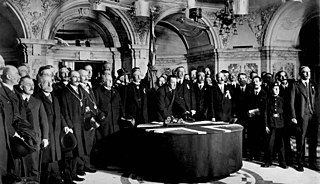
Ulster's Solemn League and Covenant, commonly known as the Ulster Covenant, was signed by nearly 500,000 people on and before 28 September 1912, in protest against the Third Home Rule Bill introduced by the British Government in the same year.
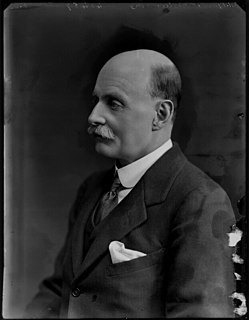
Walter Hume Long, 1st Viscount Long,, was a British Unionist politician. In a political career spanning over 40 years, he held office as President of the Board of Agriculture, President of the Local Government Board, Chief Secretary for Ireland, Secretary of State for the Colonies and First Lord of the Admiralty. He is also remembered for his links with Irish Unionism, and served as Leader of the Irish Unionist Party in the House of Commons from 1906 to 1910.
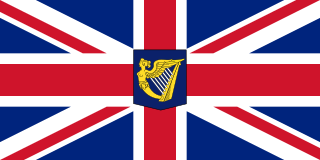
Ireland was part of the United Kingdom of Great Britain and Ireland from 1801 to 1922. For almost all of this period, the island was governed by the UK Parliament in London through its Dublin Castle administration in Ireland. Ireland underwent considerable difficulties in the 19th century, especially the Great Famine of the 1840s which started a population decline that continued for almost a century. The late 19th and early 20th centuries saw a vigorous campaign for Irish Home Rule. While legislation enabling Irish Home Rule was eventually passed, militant and armed opposition from Irish unionists, particularly in Ulster, opposed it. Proclamation was shelved for the duration following the outbreak of World War I. By 1918, however, moderate Irish nationalism had been eclipsed by militant republican separatism. In 1919, war broke out between republican separatists and British Government forces. Subsequent negotiations between Sinn Féin, the major Irish party, and the UK government led to the signing of the Anglo-Irish Treaty, which resulted in five-sixths of Ireland seceding from the United Kingdom.

The Irish Unionist Alliance (IUA), also known as the Irish Unionist Party or simply the Unionists, was a unionist political party founded in Ireland in 1891 from the Irish Loyal and Patriotic Union to oppose plans for home rule for Ireland within the United Kingdom of Great Britain and Ireland. The party was led for much of its existence by Colonel Edward James Saunderson and later by William St John Brodrick, Earl of Midleton. In total, eighty-six members of the House of Lords affiliated themselves with the Irish Unionist Alliance, although its broader membership was relatively small.

The Larne gun-running was a major gun smuggling operation organised in April 1914 in Ireland by Major Frederick H. Crawford and Captain Wilfrid Spender for the Ulster Unionist Council to equip the Ulster Volunteer Force. The operation involved the smuggling of almost 25,000 rifles and between 3 and 5 million rounds of ammunition from the German Empire, with the shipments landing in Larne, Donaghadee, and Bangor in the early hours between Friday 24 and Saturday 25 April 1914. The Larne gun-running may have been the first time in history that motor-vehicles were used "on a large scale for a military-purpose, and with striking success".
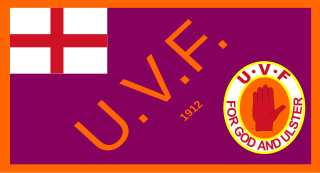
The Ulster Volunteers was a unionist militia founded in 1912 to block domestic self-government for Ireland, which was then part of the United Kingdom. The Ulster Volunteers were based in the northern province of Ulster. Many Ulster Protestants feared being governed by a Catholic-majority parliament in Dublin and losing their local governance and strong links with Great Britain. In 1913, the militias were organised into the Ulster Volunteer Force (UVF) and vowed to resist any attempts by the British Government to impose Home Rule on Ulster. Later that year, Irish nationalists formed a rival militia, the Irish Volunteers, to safeguard Home Rule. In April 1914, the UVF smuggled 25,000 rifles into Ulster. The Home Rule Crisis was halted by the outbreak of World War I in August 1914. Many UVF members enlisted with the British Army's 36th (Ulster) Division and went to fight on the Western Front.

The Buckingham Palace Conference, sometimes referred to as the Buckingham Palace Conference on Ireland, was a conference called in Buckingham Palace in 1914 by King George V to which the leaders of Irish Nationalism and Irish Unionism were invited to discuss plans to introduce Home Rule to Ireland and avert a feared civil war on the issue. The King's initiative brought the leaders of Nationalism and Unionism together for the first time in a conference.

The Irish Home Rule movement was a movement that campaigned for self-government for Ireland within the United Kingdom of Great Britain and Ireland. It was the dominant political movement of Irish nationalism from 1870 to the end of World War I.
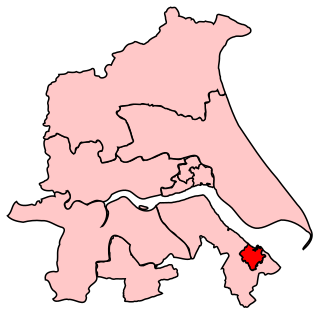
The Great Grimsby by-election was a Parliamentary by-election. It returned one Member of Parliament to the House of Commons of the United Kingdom, elected by the first past the post voting system. It was one of the last by-election contests to take place before the outbreak of the Great War, and provided a good indicator of how the main parties would have performed at an anticipated general election for 1914 or 1915.
The Chorley by-election was a Parliamentary by-election. It returned one Member of Parliament to the House of Commons of the United Kingdom, elected by the first past the post voting system. Although it was a safe Unionist seat which was held, the reduction in the Unionist majority was notable.

The Home Rule Crisis was a political and military crisis in the United Kingdom of Great Britain and Ireland that followed the introduction of the Third Home Rule Bill in the House of Commons of the United Kingdom in 1912. Unionists in Ulster, determined to prevent any measure of home rule for Ireland, formed a paramilitary force, the Ulster Volunteers, which threatened to resist by force of arms the implementation of the Act and the authority of any Dublin Parliament. Irish nationalists responded by setting up the Irish Volunteers "to secure the rights and liberties common to all the people of Ireland". Both sides then began importing weapons and ammunition from Germany, in the Larne gun-running and Howth gun-running incidents. HM Government's ability to face down unionist defiance was thrown into question by the "Curragh incident", when dozens of British Army officers tendered their resignations rather than secure arms against Ulster loyalist seizure, forcing a climb-down by the government. The crisis was temporarily averted by the outbreak of World War I. The Home Rule Bill was enacted, but its implementation was suspended for the duration of the war.
The issue of Ireland was a major one in British politics off and on for centuries. Britain's attempts to control and administer the country had at times significant consequences for British politics, especially in the 19th and 20th centuries. Although nominally autonomous until the end of the 18th century, Ireland became part of the United Kingdom of Great Britain and Ireland in 1801.
References
- ↑ Adams, R.J.Q. (1999). Bonar Law. John Murray (Publishers) Ltd. ISBN 0-7195-5422-5. p.145
- 1 2 Adams (1999) p.146
- ↑ Diana Elaine Sheets, British Conservatism and the Primrose League: the changing character of popular politics , quoting from Minutes of the Grand Council of the Primrose League.
- ↑ Ulster's Stand For Union Archived July 13, 2011, at the Wayback Machine , Chapter 15, by R J McNeill
- ↑ New York Tribune, June 07, 1914